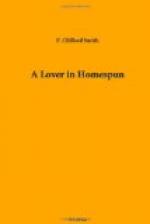I awoke a little after eight o’clock, and was just about to hurry into my clothes to see what the weather was like, when I suddenly decided there was no need of any undue haste—the roar of that festive wind could have been heard a mile away.
When I did reach the body of the car and looked out of the window, a sight met my gaze that might have made a less sinful man, than one who had spent the best part of his life on railways, give vent to comments that I am persuaded would not appear quite seemly in print. Our car was wedged well-nigh up to the windows in a huge drift, while the wind, which had whipped the harassed snow into fragments as fine as dust, caught up great clouds of the dismembered flakes, and with triumphant shrieks drove them against the panes of glass. As I stood glaring at this inspiring picture, Fielding joined me and said, as he, too, feasted his eyes on the scene: “A villainous day! we shall be lucky if we get home by midnight. A lovely way to spend Christmas shut in like rats in a trap! If we only had our cook to do up the little food we have, it would not be so hard on us.”
This last reflection was uttered in such a doleful key that I had considerable difficulty in not laughing outright, for my superior officer was a man of imposing breadth, and I knew his one weakness was the love of a good meal. The contemplation of the loss of his Christmas dinner had made him forget his usual blunt, hopeful tone of speech, and adopt this dismal strain.
During the long pause which followed, I knew that he was casting anxious glances at me. Finally he said, insinuatingly: “Er—er—William, during all the years that I have known you, it never occurred to me to ask you if you knew anything about cooking. But, of course, it is a foolish question to put to the assistant-superintendent of a railroad,” he added deprecatingly.
I was sorry to have to admit that my education in the culinary art had been sorely neglected.
It must have been about two hours after partaking of our Christmas breakfast, which consisted of bread and butter, cheese and tea, that we had managed somehow to scrape together, that Fielding said to me: “Why, William, there is the conductor, and the driver, and the fireman—perhaps one of them knows enough to roast that beef in the larder. Suppose you go and interview them. There is enough meat there to make a dinner for the lot of us.”
The suggestion struck me as being a good one, and I wondered that I had not thought of questioning them about the matter earlier in the morning. I soon had the trio marching behind me into our car, to be examined as to what they knew of the now much-to-be-desired art of cooking.




